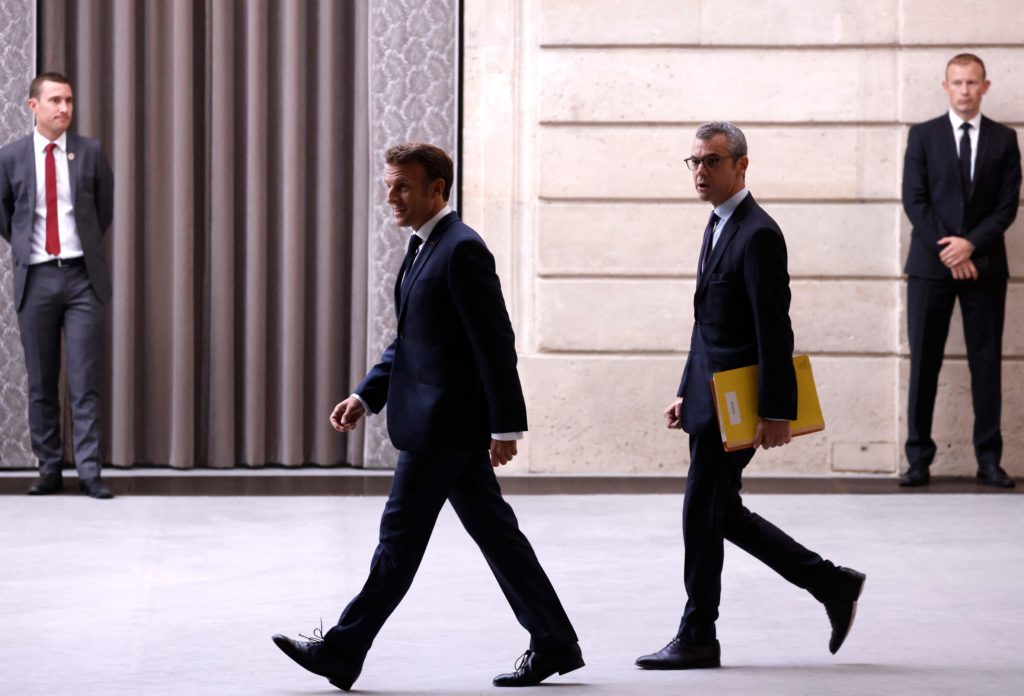PARIS — French President Emmanuel Macron swept to power in 2017 after running as an independent centrist who promised to be an ambitious reformer, including on ethics, following corruption scandals that had tarnished previous administrations.
But events this week show he has given up on some of those promises. Two of Macron’s top allies in government are now facing judicial investigations, but the president has made clear he won’t budge on his support for them.
Alexis Kohler, Macron’s chief of staff and the most powerful figure in the Elysée after the president, has been charged because of an alleged conflict of interest, French media reported Monday.
The news of the indictment sent shockwaves through the French politics and media bubble. Kohler, a top political operative and Macron’s most faithful lieutenant, is as close as you can get to the president.
The report came just a few hours after a special court ruled that Justice Minister Eric Dupond-Moretti should face trial over allegations that he used his position to settle scores with his opponents inside France’s financial prosecutor’s office.
In both cases, Macron’s reaction was the same: He shrugged it off.
The French president has decided to mostly ignore judicial investigations targeting his closest allies in a mix of political calculation and pragmatism.
On Monday, as reporters were frantically reaching out to the Elysée for comment on Kohler, the presidential palace’s press service kept their messaging to a bare minimum, referring only to Kohler’s lawyers’ statement — in which he denied any wrongdoing.
They made one thing clear, however: Kohler isn’t going anywhere. Dupond-Moretti seemingly received similar assurances.
This provoked widespread criticism from opposition leaders and the media alike.
“The president of the Republic, Emmanuel Macron, considers that he can pretty much do whatever he wants and that is an ethical problem, a political problem and an institutional problem,” said conservative MP Aurélien Pradié, from Les Républicains.
No more red lines
Macron’s attitude marks a stark contrast with the early days of his first term, when he vowed to significantly strengthen ethics rules governing French political institutions in the aftermath of the fake job scandal that hit his conservative rival, François Fillon, in the 2017 election.
The then-candidate vowed to uphold an unwritten rule of French politics: “A minister who’s been charged must leave the government,” he said during the campaign.
A self-proclaimed disrupter of French politics, Macron, the then-presidential candidate, had nothing to lose and everything to gain when promising the highest standards of ethics for governmental institutions and operatives.
Shortly after he was elected, he passed a law to strengthen ethics rules, including a ban on hiring close family members as staffers. Two of his closest allies in his first government, centrist leaders François Bayrou and Marielle de Sarnez, had to step down from ministerial roles when an investigation was launched into alleged misuse of EU funds by their party.
But that was yesterday’s politics, and the then fresh-faced, now battle-hardened disrupter-in-chief has come a long way since.
“When you have not yet exercised the responsibilities, you think you can be a white knight, more virtuous than others … and then reality catches up on you,” Socialist Jean-Jacques Urvoas, a former justice minister under Macron’s predecessor, François Hollande, said. “He doesn’t talk about it anymore … because he knows that in truth it is a kind of mirage, you will never be perfect. [Now] he does realpolitik.”
Macron has also made clear in the past that he won’t cave to public pressure when it comes to allegations targeting his top allies. He never wavered in his support for Interior Minister Gérald Darmanin, accused of rape — the investigation was closed without prosecutors pressing charges. When his former Environment Minister Nicolas Hulot was accused of sexual misconduct by several women in media reports, he said victims should be heard but warned against “an inquisition society.”
French President Emmanuel Macron and his chief of staff, Alexis Kohler ❘ Pool photo by Ludovic Marin/AFP via Getty Images
In this week’s developments, however, the pressure is first and foremost coming from legal proceedings.
Bayrou, Macron’s top ally in his governing coalition (and himself still under investigation over his party’s alleged misuse of EU funds), buried the old charged-means-out rule in an interview to Le Monde: “There are more and more formal indictments and allegations in front of the courts,” he said. “Given the number of cases that are making headlines, it is becoming impossible to let this type of decision change the organization of political responsibilities.”
French judges have been up in arms about what they say are “grave attacks on the independence of the French judiciary by Justice Minister Éric Dupond-Moretti” but politically speaking, the risk for Macron months into his second mandate is limited.
Ordinary French citizens are worried about the cost of living and the risk of energy shortages, presumably less so about politicians’ ethical standards, where they have fairly low expectations : 36 percent of the French expressed mistrust in politics in a study by research institute Cevipof, by far the most commonly associated feeling with the word.
“Do the French approve that he is keeping a minister who was formally charged? No,” said Urvoas. “But it doesn’t impact Macron. He’d rather show that he is in control of his own decisions.”
For the president, Urvoas argued, the case is an opportunity to show that he is still very much in charge, just as he is set to face a serious political headache: Macron is still hoping to push through his flagship pension reform despite having lost his absolute majority in the Parliament.
Whether he succeeds or not is likely to define his legacy as a reformist at home. Call it cynicism, but his government’s ethical standards are probably the least of his worries.




